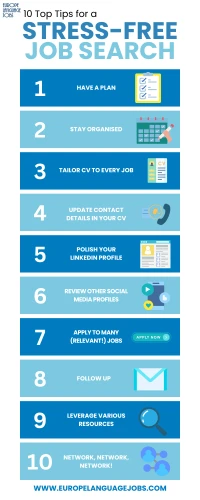
A Recipe for a Stress-Free Job Search
The job search can be a stressful period. Sending out multiple applications, waiting for responses, and handling the inevitable rejections can take their toll on job seekers’ mental health.
At Europe Language Jobs, we aim to make job search as easy and stress-free as possible. We want to show you that searching for a job doesn’t have to be a nerve-wracking experience, if done right.

Here are our top tips for a stress-free job search:
- Have a plan
- Stay organised
- Tailor your CV to every job
- Double-check your contact details
- Polish your LinkedIn profile
- Review your other social media profiles
- Apply to many (relevant!) jobs
- Follow up
- Leverage various resources
- Network, network, network!

-
Have a plan
Nothing will stress you out more than a lack of a plan or strategy for your job search. There are many things you can’t predict, such as the companies’ response time or how many of your applications will get accepted. But focus on the aspects within your control.
Set weekly goals. Decide how many applications you can realistically submit every week and stick to it. Keep track of what percentage of employers responds, and how many invite you for interviews. This will help you assess the number of CVs you need to send out for a high success rate.

-
Stay organised
Chaos is your worst enemy. Keep track of all applications - create a spreadsheet where you will write down the name of the company, the date you applied, the recruiter’s name and contact details (if you have them), and any additional comments you may have about each application.
This will help you see how much time has passed since submitting your application and send follow-ups on time. By staying organised, you will also avoid applying to the same company twice. This is quite common when bulk-applying to multiple positions in times of intense job search, but it looks very unprofessional to recruiters.

-
Tailor your CV to every job
We cannot stress this enough - you MUST tailor your CV to every position you apply for. It’s not something career advisors repeat like a broken record just to make your life harder. It really is supposed to make things easier for you.
Tailoring your CV to every job increases your chances of being selected for the position. Lowering the possibility of being rejected will take some stress out of your job search.
There are many reasons why you should tailor your resume to every application, but the main ones are passing through the Applicant Tracking System (ATS), demonstrating you are a good match for this position, and showing you made an effort to stand out among other candidates.

-
Double-check your contact details
Even if you adjust your CV before every application, many job seekers leave out the section with contact details. After all, they always stay the same - until they don’t.
You wouldn’t believe how many applicants forget to update the contact details in their CVs when they change their phone number or email address. It is a recruiter’s worst nightmare - finding the perfect candidate and being unable to contact them.
What’s more, make sure you actively use the phone number and email address on your resume. If you reply to an email from a recruiter a month later, they won’t be impressed.

-
Polish your LinkedIn profile
Recruiters don’t look only at your CV anymore. Resumes have to be very compact to fit all the essential information about your professional life on one page. They are only an initial indication of whether you’re a good match, but to find more details, hiring managers often head over to LinkedIn.
There are no space limits in your LinkedIn profile. You can add all the skills, certificates, achievements, and job experience you want. It’s a great opportunity to show off all your best traits - don’t miss out on it.
Make sure you fill in your profile with all the crucial information about you as a professional and update it regularly. Choose an appropriate photo and an eye-catching background image.
And, most importantly - be active. Many recruiters admit that they pay a lot of attention to the candidates’ recent activity. Do they publish their own posts? Repost others that interest them? Leave any comments? Engage with the community? Openly demonstrate that they are genuinely interested in their field?
Employers like proactive candidates. Spending 15 minutes a day crafting an insightful LinkedIn post or leaving a few valuable comments can just be what will get you selected over your competition.
Be careful about what you post and how you express yourself, though. All your activity is visible on your profile, so make sure to stay polite, use inclusive language, and treat others with respect.

-
Review your other social media profiles
It is no secret that recruiters visit the candidates’ social media profiles. Still, many job seekers keep forgetting about it.
You should generally keep your social media profiles decent, but even more so in periods of active job search. Before you start sending out applications, make sure there is no inappropriate content gracing your feed.
Avoid displaying content featuring alcohol and other stimulants. Refrain from cursing or using derogatory language in your posts, descriptions, and comments. Remove photos and videos where you or your friends make inappropriate gestures.
Similarly to your activity on LinkedIn, be mindful of the content you share and interact with on other social media. Offensive comments or likes under improper posts can be visible to other users.
If you don’t want to remove or adjust content, just make your profile private. However, your social media profiles can be an opportunity to back up your achievements with insightful posts and creative photos, so use that to your advantage.

-
Apply to many (relevant!) jobs
In an ideal world, we would only send up to five resumes and be hired. Sadly, when Stand Out CV conducted a study to test how it works in the real world, the results showed that an average person needs to send out 162 applications to get a job.
Of course, you should primarily apply to roles that interest you the most. But don’t rely just on your top choices - hope you will get one of them, but have several backup options. The more applications you send, the more likely it is you will hear back from at least one of them.
But by applying to many jobs, we don’t mean: apply to any job. Stay within your industry and choose jobs you are actually qualified for and would genuinely enjoy doing.
In fact, applying to irrelevant job offers lowers the chances of a stress-free job search. So, the key takeaway here is to apply for as many relevant jobs as possible but don’t lose time on positions outside of your area of interest and experience.

-
Follow up
According to Resume.io, a new vacancy gets an average of 118 applications. This number grows for positions with attractive benefits or in well-known companies.
Suffice to say, it may take a while for recruiters to sort through all those applications and get back to you. But when handling such big quantities of candidates, it is also not unlikely that one or two might get overlooked.
This is why following up is important. If your CV has landed closer to the bottom of the pile, sending a follow-up might remind the recruiters that it’s there, awaiting review.
Failing to follow up when you haven’t received a response for a significant amount of time is like giving up before you even try. Even if it turns out you weren’t contacted because your resume wasn’t chosen or because a recruiter ghosted you, then at least you will know you did your best.
Don’t follow up too soon, though. Wait around a week for positions in SMBs and startups, and up to a few weeks in bigger companies that receive huge numbers of applications.

-
Leverage various resources
When looking for a job, don’t limit yourself to just LinkedIn. There are so many other resources available these days. Use them to your advantage.
First, focus on niche-specific job boards. They only advertise positions in a certain area or industry, so you will save time by filtering out jobs you aren’t interested in. For example, Europe Language Jobs is a job board dedicated to people who want to find roles with their languages or in different countries.
Don’t forget that social media are a powerful job-seeking tool nowadays. People advertise vacancies, connect, and recommend positions or potential candidates. Be active and keep your eyes open at all times.
Join job search groups on social media. Be extra careful about job scams because such public groups aren’t as closely monitored as official job boards, but they are primarily a good opportunity to make connections.
Make sure to have a look at our article about unconventional ways to get hired to discover just how many opportunities are waiting for you out there.

-
Network, network, network!
We know you hear it everywhere. But that’s because networking was, is, and will continue to be one of the best tactics to get a job.
Did you know that candidates referred by an existing employee are three to four times more likely to get the job than applicants with no referral?
How can you get referred for a position that’s perfect for you? Through networking, of course!
Make new connections and stay on good terms with your network. You never know when one of them will hear about a vacancy you didn’t and let you know about it, or even recommend you personally.
Although you can’t take all the stress out of a job search, you can significantly lower it by applying these simple tips. Stay organised, craft a plan, take good care of your social media profiles, send tailored CVs, and make connections. Sounds doable, doesn't it?
For a stress-free job search, head over to our website and make sure to check out our jobs and download our app! Receive notifications about perfect roles for you and apply for positions all over Europe with just one click or swipe of your finger.
Feeling inspired? Visit our blog for more career advice! How can you be sure the information we provide is top-notch? We are a group of professionals working with recruiters, career coaches, and HR specialists from all over the world!
Trust our experience and let us help you find a new job in Europe!


